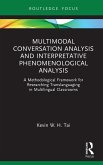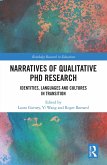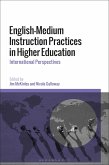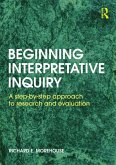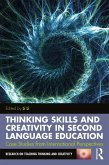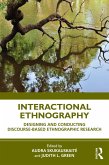Dieser Download kann aus rechtlichen Gründen nur mit Rechnungsadresse in A, B, BG, CY, CZ, D, DK, EW, E, FIN, F, GR, HR, H, IRL, I, LT, L, LR, M, NL, PL, P, R, S, SLO, SK ausgeliefert werden.
Professor Li Wei, Director and Dean, UCL Institute of Education, University College London
"This original research-based book explores vividly and insightfully the realities of English Medium Instruction (EMI) as practiced in Hong Kong secondary schools. Theoretically robust and clearly argued throughout, it succeeds in making a convincing case for the pedagogical, ethical and cultural validity of translanguaging in the EMI classroom. It is a major contribution to the Applied Linguistics literature."
Professor John Gray, Professor of Applied Linguistics and Education, University College London
"Kevin Tai's book is a distinctive and original contribution to the literature on translanguaging in pedagogy. Bringing together multimodal conversation analysis (MCA) and Interpretative Phenomenological Analysis (IPA), Tai explores the complexities of multilingualism and translanguaging in EMI contexts in a wholly novel way. His methodological approach, and his examples from Hong Kong's EMI classrooms, provide a roadmap for the study of multilingual interaction in linguistically diverse classrooms. I shall enthusiastically recommend his work to graduate students who are getting to grips with trans-orientations towards research into multilingual classroom practice."
Dr. James Simpson, Associate Professor, Division of Humanities, The Hong Kong University of Science and Technology
"In this book, Kevin Tai offers a unique framework to study classroom interaction in multilingual settings. The framework, combining Multimodal Conversation Analysis (MCA) and Interpretative Phenomenological Analysis (IPA), enables in-depth, 'insider' study of translanguaging practices. Given the complexity of translanguaging, this book provides researchers with a systematic and multi-faceted approach to the study of classroom interaction in multilingual settings. As such, it offers enormous potential in developing new understandings of the complex relationship which exists between language, interaction and learning. It will be of considerable value to researchers working with classroom interaction data, to teachers who wish to understand their interactions with students more fully, and to policymakers who need to understand the complexities of classroom life more fully."
Professor Steve Walsh, Professor of Applied Linguistics, School of Education, Communication and Language Sciences, Newcastle University
"This book offers a fresh perspective on the study of translanguaging and provides a comprehensive methodological framework that will undoubtedly inform and inspire future research in this field. Moreover, this book will be useful for academics who undertake translanguaging research in linguistically and culturally diverse classrooms since it provides a concise discussion on the methodological techniques for examining translanguaging practices in multilingual classroom situations."
Yohana Dian Rahayu Ningsih, Faculty of Language and Literature Education, Universitas Pendidikan Indonesia (The Education University), Indonesia
"As language educators, this book has been invaluable in deepening our understanding of translanguaging practices within multilingual classrooms. The author's emphasis on sociocultural factors and their role in shaping translanguaging processes has illuminated the complexities of language use and identity in the classroom. Moreover, the practical examples and the pedagogical model presented in Chapter 5 have inspired us with strategies to create translanguaging sub-spaces within our own classrooms. This book has not only expanded our knowledge but has also influenced our instructional practices, enabling us to better support our students' linguistic and cultural diversity."
Farida Amansyah and Ismail Anasm - The Qualitative Report



